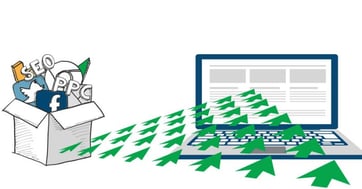Editor's Note: This post was originally published in April 2017 and was updated with additional information in October 2023.
Why is PPC good for lead generation? This is a common question among digital marketers. Most marketers are familiar with a traditional sales funnel where leads filter from the top down, encountering various stages of the funnel before converting to customers at the end of the sales process.
However, with the growing impact of social selling and social media, a lead can convert at any stage of the process. As a result, many are beginning to wonder if pay-per-click (PPC), the more “traditional” of digital marketing tactics, is still an effective method for generating qualified leads for businesses.
As a specialist in the 4 pillars of digital marketing - search, site, social, and mobile - I am as passionate about effective online lead generation as everyone else in the WSI network. My deep understanding of this strategy is based on knowledge and practical experience of having applied it successfully to my clients’ (and my own) business! I am, therefore, well placed to talk about why PPC continues to be one of the most outstanding methods for online lead generation.
To generate high-quality leads for your business, setting up a successful lead generation campaign is crucial. Several key elements should be carefully considered when planning such a campaign. The landing page of your PPC campaign should ideally direct to your product or service but could also be used to generate leads in the form of completed forms or sign up for newsletters.
Why You Need PPC for Lead Generation Marketing
Let me elaborate on some of the advantages that PPC has over other lead generation methods:
- It’s measurable: The single greatest advantage of any lead generation method is the ability to measure the exact cost per lead. With traditional above-the-line marketing, this is always challenging. How many leads did a newspaper or radio campaign generate? PPC, whether paid search, display, or social ads, all have a method to be able to track a conversion. It could be a form filled in, an email, or a phone call, but you can tell when you have that lead firmly in the first level of your funnel, and you know exactly how it got there. That allows you to see what the cost per lead of each strategy is and adjust your path accordingly.
- It’s targeted: Paid search, social, and display marketing all require you to select where, when, and whom you want to show your ads to. You can select people based on their age, what they typed in as a search on Google, what type of content they are reading, or even if they have kids or not! Seth Godin says, “Everyone is not your customer,” and this is a key thing to understand in marketing. By knowing your target market, you can reach them with an idea that resonates with them. Being able to target exactly the person who is your ideal customer can reduce your cost per lead and increase your overall ROI.
- It’s evolving: Selling advertising is actually how most of the large internet companies make their money, Facebook and Google being at the forefront of this. In fact, the majority of Google's revenue is generated through advertising and from ad clicks on the Google search page. That figure doesn’t even include revenue generated from the wider Display Network or YouTube! That is $224 billion from people clicking on ads after doing a search on Google. Since these ad platforms are their money makers, it makes sense for these companies to spend a lot of time and effort developing their ad platforms to make it easier and more beneficial for advertisers to spend money with them. For advertisers, this means that you have a constantly evolving tool that offers several unique benefits.
- You can reach the same people again: Whether you call it remarketing or retargeting, the ability to show ads to people who have already interacted with you is powerful. There is an old marketing adage called the Rule of 7 – a potential customer needs to have 7 touchpoints or exposures to your brand before they take action. Now what if you could accelerate this process by showing your brand to people that had already been on your website? That’s remarketing. Some companies have had absolutely extraordinary results with remarketing, both on display platforms and on social. What is clear is that PPC has given us new and unique ways to stay top-of-mind.
Generating Leads Through PPC
Your PPC lead generation strategies are what set you apart from your competitors. In order to get more leads with PPC, you need to focus on the search intent of your target. The benefit of PPC, in this case, is that you can set up your marketing campaign to limit your PPC audience to only those who are ready to purchase. Effective lead generation focuses on the ROI of your PPC campaigns over the number of leads you get.
Is PPC lead generation?
PPC is indeed a method of lead generation. It is a digital advertising strategy where advertisers pay a fee each time their ad is clicked. Instead of earning traffic organically, PPC allows businesses to buy visits to their sites. Platforms like Google Ads and Bing Ads offer PPC advertising, often appearing at the top of search results.
When effectively targeted, these ads can drive potential customers to actively search for products or services, making them quality leads. However, it's essential to note that while PPC can generate leads, its success in converting those leads depends on several factors, including the landing page experience, the ad's relevancy, and the product or service's inherent appeal.
What is the difference between PPC and lead generation?
PPC and lead generation are digital marketing strategies, but they serve different primary purposes and involve different processes. PPC is a form of online advertising where advertisers pay a fee each time their advertisement is clicked. It is essentially a way of buying visits to a site rather than attracting them organically. Platforms like Google or Facebook facilitate this type of advertising.
On the other hand, lead generation is a broader strategy aimed at attracting and converting potential customers into individuals who have indicated an interest in a company's product or service. This can be achieved through various means, including content marketing, email campaigns, SEO, and, indeed, PPC. So, while PPC is specifically about paying for clicks to drive traffic, lead generation encompasses a wider range of tactics to capture and nurture potential customers. PPC is just one of those tactics.
In Conclusion
Lead generation can be a business’s largest stumbling block, but the above points show that using PPC as a lead generation tactic is a sound way to fill that sales funnel with qualified, quality leads.
Still asking yourself, "Why is PPC good for lead generation?" Then speak to a WSI Consultant in your area to find out how they can help accelerate your business growth through some powerful online lead generation strategies.






